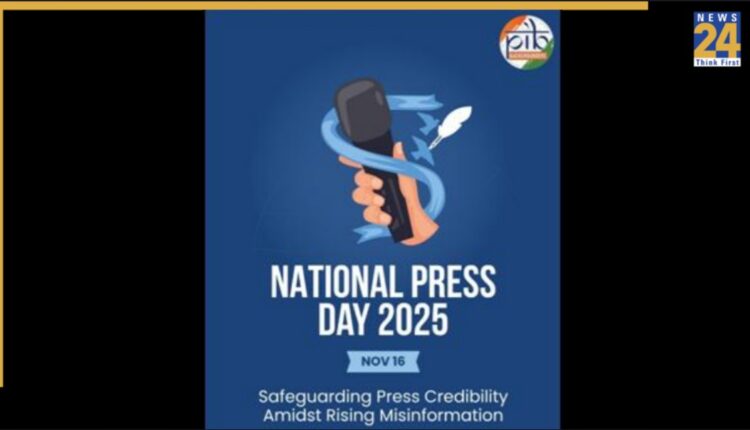Every year on 16 November, India observes National Press Day. This date marks the beginning of the Press Council of India (PCI) in 1966. The PCI was created to act as a watchdog over the press, ensuring that journalists work with both freedom and responsibility. It looks into complaints against newspapers and reporters, and helps maintain basic ethics in the media. The idea of such a body first came from the Press Commission of 1952, and it finally took shape after a law was passed in 1965. National Press Day therefore honours the formation of the PCI and the important role of a free and fair press in our democracy.
But the message of this day goes deeper. It reminds us of the strength and duty of the fourth pillar of democracy—the press. In a country as large and diverse as India, the media informs citizens, questions those in power and shapes public thinking. National Press Day is not only a celebration of journalists; it is a reminder that press freedom is essential for justice, development and transparency. Each year, a new theme highlights modern challenges—be it fake news, digital tools or responsible reporting.
What India Needs to Take Away
India’s media landscape is vibrant—from large national newspapers to local TV channels and fast-growing online platforms. But there are clear lessons we must adopt to strengthen journalism.
First, independence must remain strong. During the Emergency of 1975, the press was forced to follow the government line. Today, influence comes through business interests, advertising pressure and political control. Many journalists, especially in rural areas or while reporting on corruption, face threats. The lesson is simple: the press must stay free from bias. Media owners should not push personal or political agendas. The PCI and the courts must protect reporters from intimidation. A free press uncovers scams—like the 2G and coal block cases—and supports clean governance.
Second, India must fight fake news and rebuild trust. With WhatsApp, YouTube and social media, false information spreads in minutes. Riots like the one in Muzaffarnagar in 2013 were worsened by rumours. The solution lies in media literacy, starting with school education. Newsrooms must double-check facts. Platforms like Alt News and Boom Live should be encouraged. During elections, strong action is needed against paid news. Honest reporting protects lives and strengthens democracy.
Third, the press must include every voice. India’s diversity—rich and poor, rural and urban, multiple cultures and faiths—deserves fair representation. But the media often focuses mainly on cities, celebrities and big politics. Issues of farmers, tribals, small towns and women receive limited coverage. The solution is to train journalists from smaller regions and underrepresented communities. Regional languages must be given more importance. Digital platforms can reach remote areas at low cost. A balanced press brings people together instead of dividing them.
Fourth, technology must be used with care. Online news is expanding quickly, but it also brings clickbait, trolling and deepfakes. AI tools can help verify information, but they can also spread misinformation. Ethical rules for digital journalism must be updated. Reporters need training in data journalism and online safety. Internet rules should not become tools to silence free speech.
Why the Press Must Highlight STEM
Another concern is the lack of focus on STEM—science, technology, engineering and mathematics—in mainstream media. Instead of encouraging young Indians towards innovation, research and scientific curiosity, most channels are stuck on cricket, crime and cinema because they guarantee easy TRPs. This limited coverage shapes young minds, drawing them towards gossip and entertainment rather than problem-solving and creativity. The press plays a crucial role in shaping the future, and it must highlight the achievements of scientists, engineers, researchers and innovators. Such reporting can inspire millions of children to choose STEM fields and help build a stronger India.
Learning From History
We must also look back at our own media history. Journalists like Ramnath Goenka proved that courage and truth can stand firm even against powerful forces. Today, with more than a lakh newspapers and thousands of TV channels, the media is vast, but self-discipline is still necessary. The public too must support good journalism by paying for reliable news instead of depending solely on free, unverified content.
National Press Day is more than just a reminder of the past—it is a call to action. For India to progress, the press must remain fearless, fair and committed to public interest. Only then can it guide the world’s largest democracy towards justice and truth.
On this National Press Day, let us pledge:
A responsible press is the foundation of a stronger nation.

